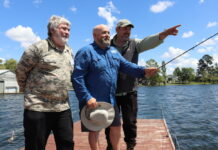Post and photos by: Evan Jones
I recently met up with a bunch of guys from my old college fly-fishing club, most of whom I hadn’t seen in twenty years, for a day on the water. We had a lot of catching up to do, but I was particularly interested to see how each of our relationships with fly fishing had evolved over that time. We used to have the luxury of spending 100 days a year on the water, but life inevitably found ways to limit our free time since then: careers, spouses, kids, debts, health issues, and all the other standard benchmarks of adulthood. But in spite of these ubiquitous obstacles, we had all still managed to stick with the hobby.
As the day progressed, it became increasingly apparent that this wasn’t a matter of chance, but rather the result of concerted efforts we had each made to continue fishing. While everyone’s circumstances are unique, the various strategies employed seem universal enough to be worth sharing here, in the hopes that they’ll inspire other anglers whose hobby may have taken a back seat lately to the demands of everyday life.
Set Up a Routine

Sam had definitely done the best job of making time for fly fishing, in spite of having a young family and a full-time job. His setup routine was still smooth, and he was the only one who caught multiple fish that day. As we were rigging up, he showed me the flies he’s been tying lately: plain thread midges on size 20 hooks. And when I say plain, I mean thread tapered around a matte-black hook, and nothing else. He told me “I don’t have time to tie fancy flies anymore. But I can crank these out in less than two minutes from start to finish, and they work better around here than a lot of the complex patterns anyway.” Most of the other guys said they didn’t have time for fly tying anymore, but Sam had found a way to keep his skills current, two minutes at a time. Every single fish he caught that day was on the thread midge, providing both positive feedback and the need to tie more flies, ensuring that the whole virtuous cycle continues.
Maintain Angling Friendships
Shawn was former president of the club, and he had coordinated this reunion trip. That was his secret to sticking with fly fishing: he had introduced so many people to the sport over the years, had made so many personal and professional connections in the industry, that he was constantly getting pulled back in. While he hadn’t guided in many years, Shawn did hold onto one local gig that gives him access to a prime stretch of private water not far from home. “We could always fish the Ranch,” he offers, whenever we discuss our options for the day. “The water might be high, low, warm, cold, or dirty, but at least we’ll have the place to ourselves.” We may not all be fortunate enough to have access to private water, but knowing a place off the beaten path where you can fish in solitude (even if it’s not a very productive fishery) can make it more likely that you’ll go, especially in regions where heavy fishing pressure elsewhere can be discouraging.
Set Aside a Fishing Day

Jeff originally said he couldn’t make it, but surprised us all by showing up anyway. As a partner at a local law firm and father of two, he didn’t have much time for fishing anymore either. “Last-minute day trips like this are really tough now,” he told me. “These days, it’s actually easier for me to do a big week-long destination trip than to sneak out for an afternoon of fishing in my own backyard. I’d be more likely to join you guys in Alaska than here on the South Platte.” It seemed a bit counterintuitive at first, but longer trips typically require more advanced planning, making them easier to schedule, and multi-day missions also seem less capricious than spending a few hours messing around down by the river, raising the chances for approval from spouses and/or bosses. “I also try to keep the third Thursday of every month open for a fishing trip,” he told me. “Doesn’t really matter what day you pick, so long as it’s the same one every month. Eventually everyone just takes it for granted and lets you go.”
Always Be Ready to Fish
Brett had spent the past several years struggling to launch his own business, which had not left much time for fishing. Yet he still managed to find creative ways to get in little snippets whenever possible. “I keep a fly rod behind the seat of my truck at all times” he told me. “Don’t even put it in a tube, keep it fully rigged and everything, just broken in two. Couple times a week I stop at the bass pond on my drive home from work and spend ten minutes casting.” He was describing the same concept behind the 20 Days in September campaign, a practice which had clearly served to keep his skills sharp, even with minimal time to commit.

The reason for my keen interest in the strategies that kept each of us fishing is that I’ve seen firsthand what happens to anglers who don’t keep up with the sport as they age. During the decade I lived in Florida, retirees would join our fly-fishing club every month, thrilled to have finally achieved their lifelong goal of fishing every day. But during our group outings, many struggled with the fundamentals, revealing their lack of consistent practice over the years. Atrophied skills were often harder to reclaim than anticipated, leading to a good deal of needless frustration and disappointment. Fly anglers of all ages who employ these strategies to keep fishing will remain more engaged, and more able to actually enjoy themselves for years to come. I’m already looking forward to fishing with these guys again, even if it takes another twenty years until we all retire, so it’s good to see that everyone is keeping their skills sharp until then.
Evan Jones is the assistant editor of the Orvis Fly Fishing blog. He lives in Colorado.
Credit: Source link






























